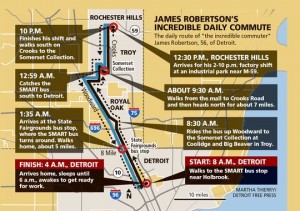By now almost the entire world has heard the James Robertson story. He is the Detroiter who walked 21 miles to work, one-way. It sounds like a story your grandparents told you about how they had to walk to 2 miles to school, in the snow, uphill, both ways! The difference is, this story is true:
“James Robertson, 56, of Detroit, walks toward Woodward Ave. in Detroit to catch his morning bus to Somerset Collection in Troy before walking to his job at Schain Mold & Engineering in Rochester Hills on Thursday January 29, 2015. James walks 21 miles daily round trip to his job.Robertson’s round trip commute requires a bus ride each direction as well as nearly 21-miles of walking consuming 22 hours of his day before beginning again throughout the work week.”
He leaves his home in downtown Detroit at 8am to make sure he makes it on time for his 2pm shift, and he’s always on time.
“I set our attendance standard by this man,” says Todd Wilson, plant manager at Schain Mold & Engineering. “I say, if this man can get here, walking all those miles through snow and rain, well I’ll tell you, I have people in Pontiac 10 minutes away and they say they can’t get here — bull!”
Why does he do this? For a job that pays $10.53 per hour. Why does he have to walk? First, his 1988 Honda Accord broke down and he couldn’t afford to fix it, he also struggled with the high cost of car insurance. Second, Detroit might have the worst large city public transportation in the nation! Why doesn’t he just move closer? The house he lives in, with his girlfriend, was inherited and they own it outright. Why doesn’t he just find a job closer to home? There aren’t many, that are good, and he’s loyal.
More loyal than 99.9% of your employees!
This story will have a happy ending. A local university student heard read this story and started a GoFundMe account to help get James a car to drive to work. As of today, that account has raised over $275,000 and both Honda and General Motors have come forward to offer him a free car! People love to give to someone who isn’t asking for it, but deserves it.
For all the bad stories we hear about of lazy employees, people who don’t want to work and live off welfare, we forget that there are more people who get up every single day and just want to work. You have more loyal employees than you have disloyal. We should be celebrating those people.
You know I love the fact this story came out of the D. Detroit got hit hard during the recession, but we are bouncing back. We are doing that because of people like James Robertson. He’s someone you should tell your kids about!

